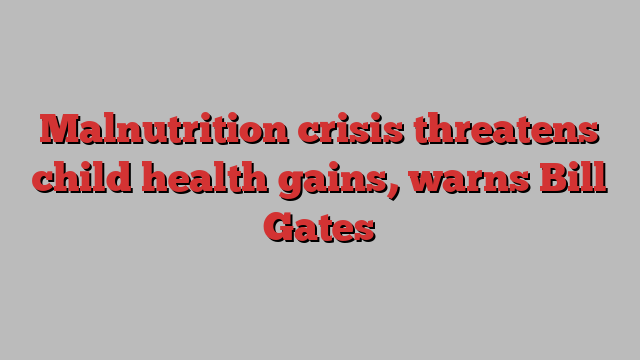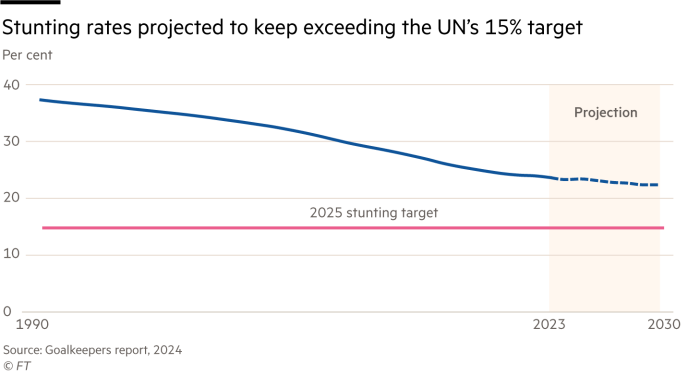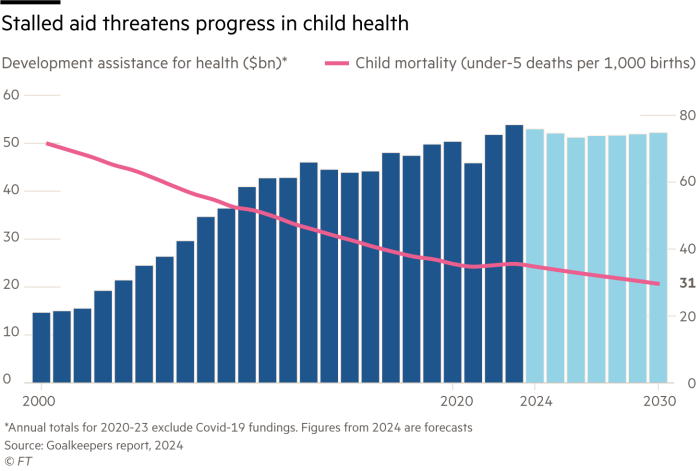
Unlock the Editor’s Digest for free
Roula Khalaf, Editor of the FT, selects her favourite stories in this weekly newsletter.
The world is facing a malnutrition crisis worsened by climate change, Bill Gates has said, warning that hard-won advances in child health are under threat unless wealthy countries increase aid where it is needed most.
Without immediate global action, the Microsoft founder and philanthropist said that between 2024 and 2050, about 40mn additional children would experience stunted growth, and 28mn more would have suffered wasting, where they become weak and emaciated. These conditions were “the most severe forms of chronic and acute malnutrition”, Gates said.
The Bill & Melinda Gates Foundation said climate change was already threatening food security and nutrition, as declining global crop productivity and higher food prices forced people to shift to cheaper, less nutrient-rich products.
The foundation’s annual Goalkeepers report, published on Tuesday, said that between 2000 and 2020, a “global health boom” had driven child mortality rates down by 50 per cent.
But progress had come to “a screeching halt” since the coronavirus pandemic. Increased defence spending on Ukraine as well as in the Middle East were among the factors that had made western countries more reluctant to donate.

The loss of funding was particularly stark in Africa, whose share of total foreign aid had dropped from nearly 40 per cent in 2010 to just 25 per cent — the lowest percentage in 20 years, putting millions of children at risk.
Rising debt levels meant some African nations were “spending more on interest payments than health and education combined”, Gates said, adding: “The reduction in the aid budgets is hurting.”
According to the World Bank, undernutrition in the form of stunted physical and cognitive abilities results in productivity losses worth about $3tn every year. In low-income countries, that loss can be equivalent to about 16 per cent of GDP, the Goalkeepers report said.
Increased investment in poorer nations would also help to ensure health crises can be caught before they become a global pandemic. “The last one cost us over a trillion dollars,” Gates told the Financial Times. “So helping these primary healthcare systems . . . is a fantastic insurance policy.”

Gates said aid should be directed to where it could have the biggest impact, including the Child Nutrition Fund, a new platform that co-ordinates donor financing. Governments must also fully fund “the established institutions that have proven effective at protecting millions of lives each year”, the report said, including the Global Fund to Fight AIDS, Tuberculosis and Malaria and the Gavi vaccine alliance, which improves access to immunisation for children in the poorest nations.
Both organisations are holding funding replenishment rounds next year. Gates said the Gavi board had originally wanted to raise an additional 20 per cent in funding but had scaled back its ambitions and was now aiming to raise the same as it did five years ago: about $2bn a year. But even that target was not certain.
“Gavi, if it raises less than it did five years ago, will have to do less measles vaccine campaigns or less [human papillomavirus vaccine] campaigns. There’s no magic here,” he added.
Rising CO₂ emissions would reduce the nutritional value of critical crops, reducing amounts of iron and zinc in daily diets, the foundation said. But if malnutrition can be solved, “we make it easier to solve extreme poverty; vaccines are more effective; and deadly diseases like malaria and pneumonia become far less fatal”, Gates said in the report.
Approaches that could help reduce malnutrition included agricultural technologies that can yield up to two to three times more milk from cows, new techniques for fortifying salt and stock cubes and expanded distribution of prenatal vitamins and micronutrient supplements, the latter costing as little as $2.60 for an entire pregnancy.
The Goalkeepers report focuses on assessing progress towards the UN’s sustainable development goals. An analysis by the Seattle-based Institute for Health Metrics and Evaluation commissioned by the foundation contributed to its forecasts.